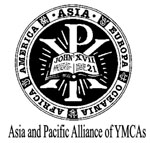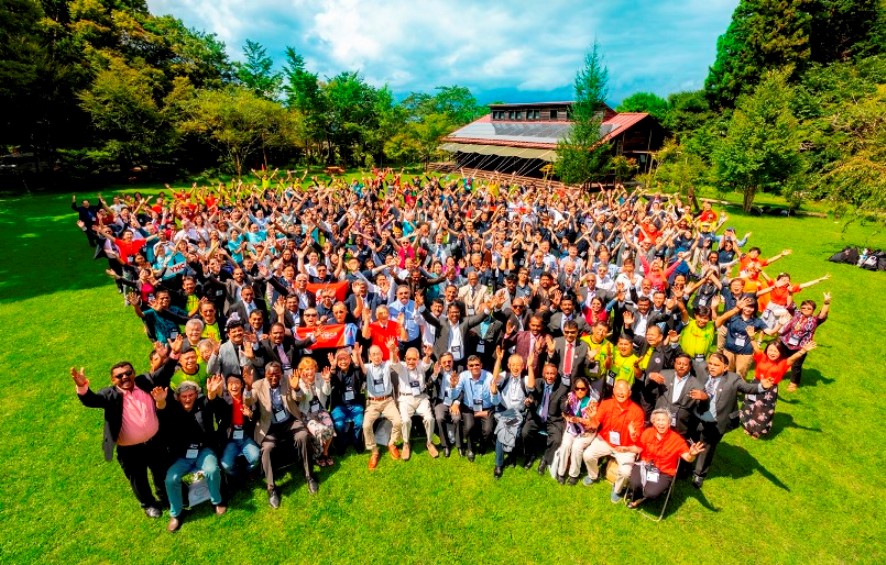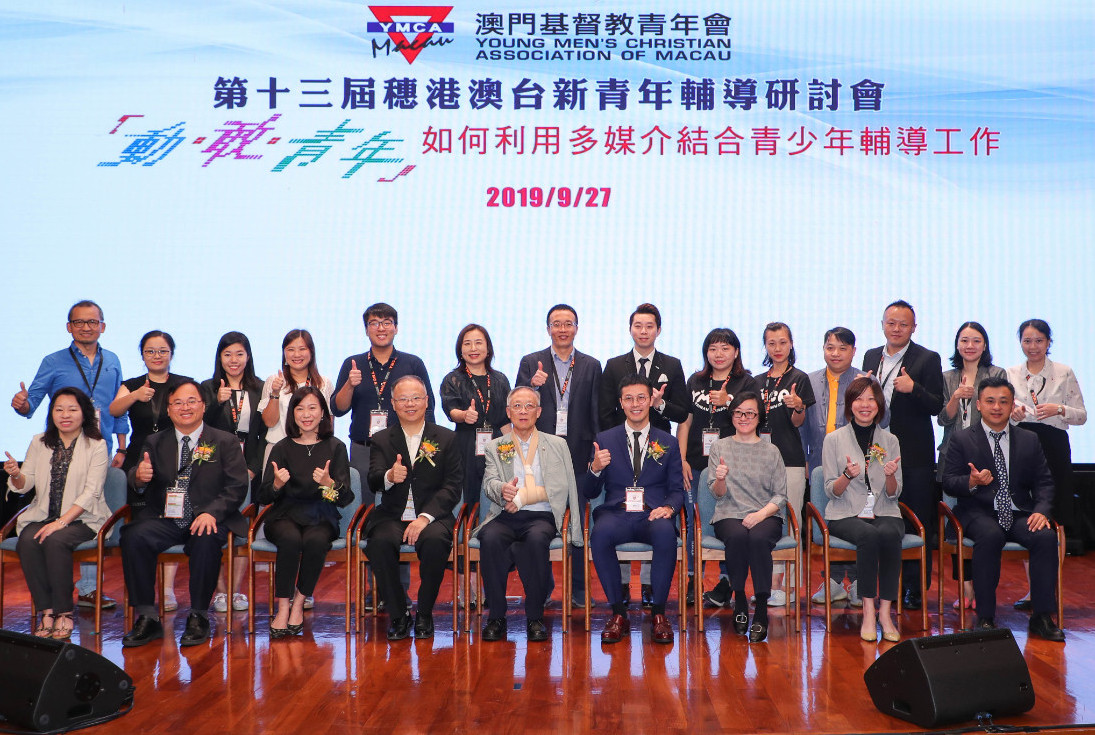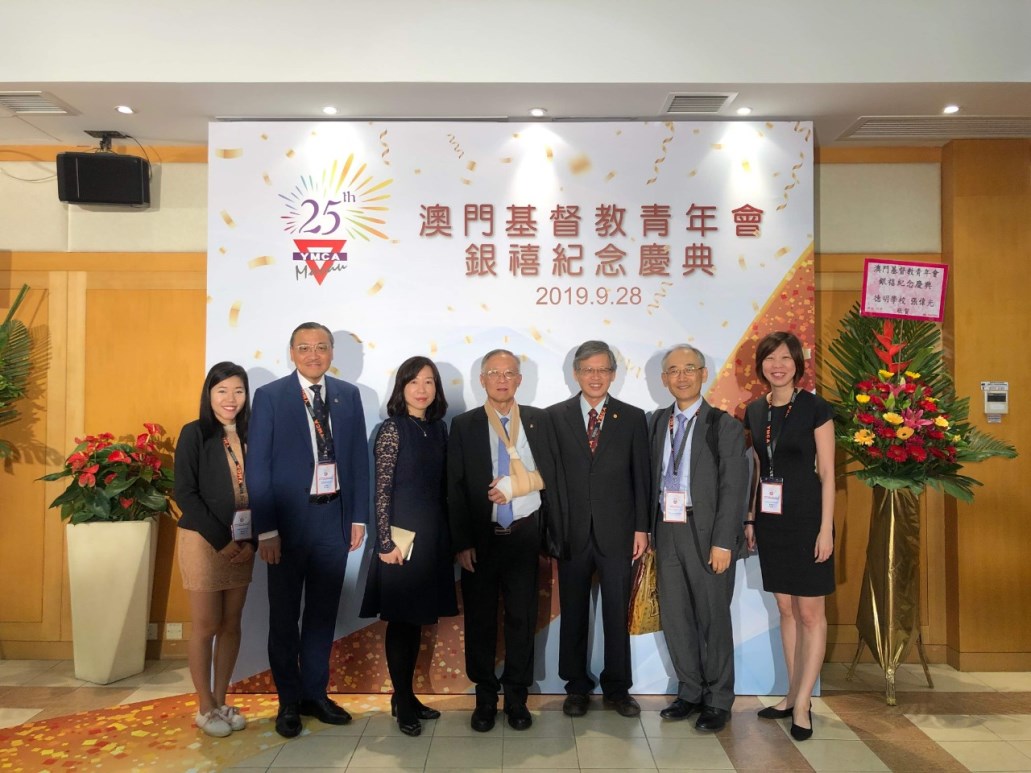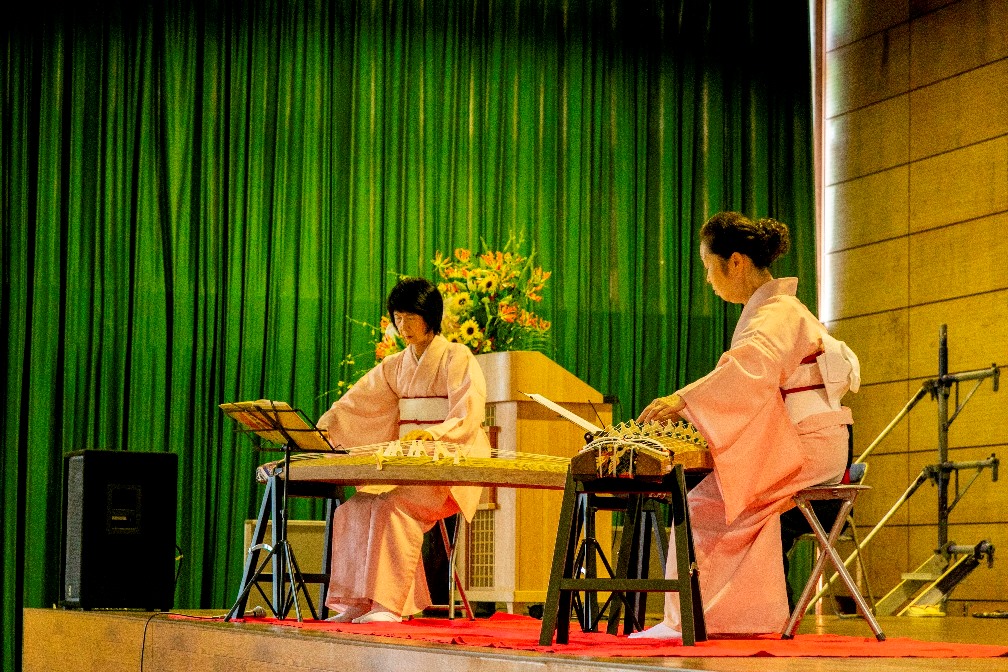 |
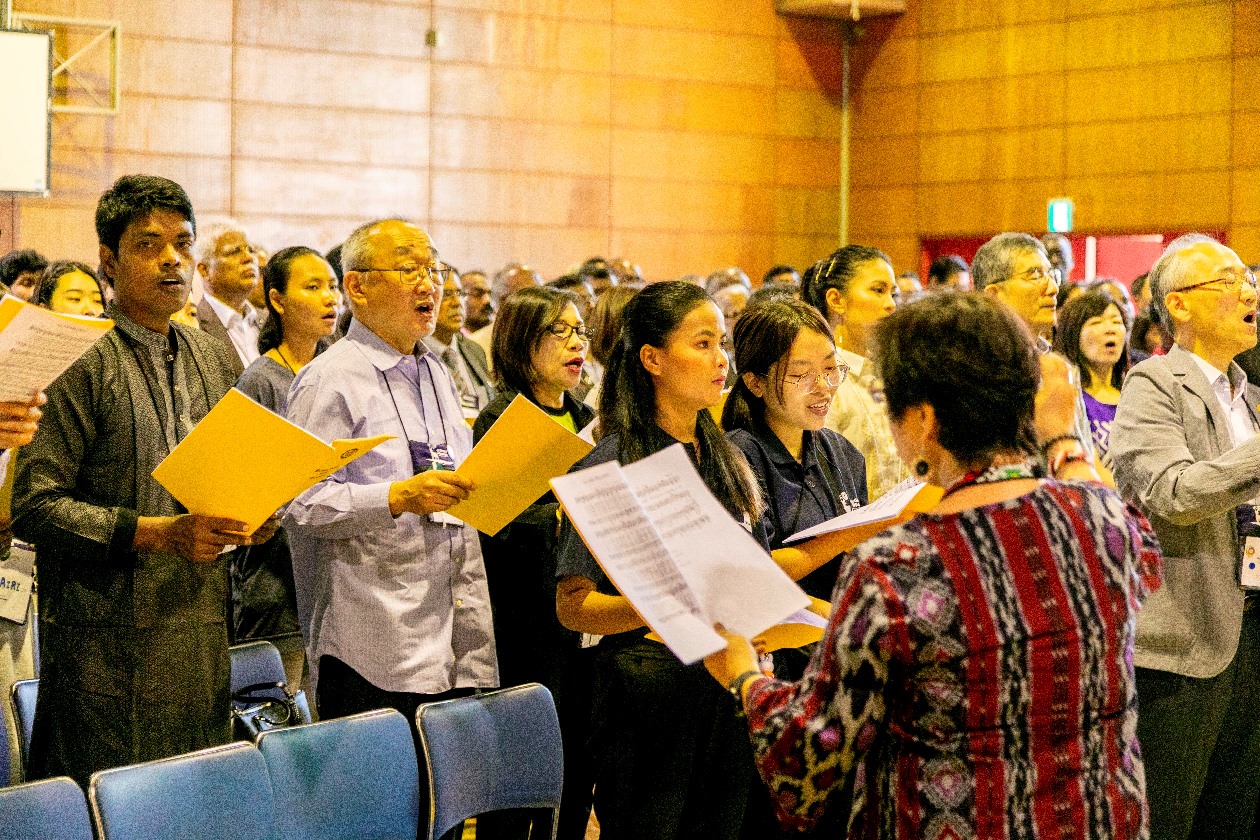 |
| ↑ Japanese instrument Koto played during opening worship |
↑ Worship chorus led in the singing of hymns during
morning devotions |
In the evening after the welcome dinner, the welcome ceremony was held with words of felicitations from the dignitaries attending the Assembly. Secretary General of the WAY Mr. Carlos Sanvee conveyed his words of felicitations, AP Mr. Hiroyuki Tanaka, Y’s Men Asia & Pacific Area, AP Mr. Kim Sang-Chae, Y’s Men Korea Area, Ms. Chung, Hiu Fan (Fanny), Executive Committee Member of WSCF AP and Ms. Natalie Thomas, Y Care International also delivered words of greetings to all the delegates on behalf of their respective organizations. The welcome dinner was enlaced with a cultural soiree depicting the rich musical and cultural traditions of Japan.
On the second day, Wednesday 4th September, 2019 Prof. Chen Chin-Seng from Taiwan led the morning worship while Dr. Emma Leslie, Executive Director, Center for Peace & Conflict Studies, shared biblical reflections on the sub-theme: “Building Communities of Peace inclusive of People and the Earth” at the worship.
Following the worship, the six parallel thematic workshops were held. These were (i) Alternative Tourism And Social Enterprise (ii) Gender Justice (iii) Ecological Concerns And Climate Change (iv) Disaster Response Management (v) Good Governance In the YMCAs and (vi) Sustainable Development Goals. These six workshops were again held on the following day at the same time. So that each of the delegate was able to participate in two of such workshops, these workshops were presented by competent resource persons. The participants were able learn more about these issues and also share their own perspectives and experiences with other participants.
The exposures arranged by the host committee on Wednesday 4th September, 2019 provided opportunities for the participants to learn more about the historical heritage, Japanese art and culture, the environmental programs, traditions and customs of Japan as well as various program activities of the Japanese YMCAs. These exposures took place in and around the Gotemba City. The delegates had the choice to participate in one of the following seven exposure sites: (i) Fuji Sanpo (ii) Tour of Fuji Gotemba Distillery and Fujisan Eco Park, (iii) Mishima Skywalk and the Kakita River Park (iv) Tokyo YMCA Yamanana Lake Center (v) Yokohama YMCA Program for the Elderly People and (vi) Yokohama YMCA Childcare Program. All youths participated at a fixed exposure at Fujisan YMCA Global Eco Village of Yokohama YMCA.
On Thursday 5th September 2019 the morning workshop was led by Ms. Magda Gana & Mr. Paul Chow. Dr. Bart Shaha, Former WAY Secretary General & GS of APAY delivered the biblical reflections on the theme “Ecological Crisis and Climate Change”.
Election of the APAY Board was held during the lunch time and the newly elected board members were: President Prof. Chen Chin-Seng from Taiwan, Vice Presidents: Ms. Hanna Dunlop from New Zealand (Pacific), Mr. Chin Chung Philip Poon from Hong Kong (East Asia), Mr. Honorio Tan from the Philippines (South East Asia) and Mr. Raymond Areng from Bangladesh (South Asia). Treasurer Mr. Shin Dae-Kyun from South Korea, and Board members: Ms. Nagako Okado from Japan and Ms. Panha Chhem from Cambodia. The Chair of the Election Committee Nirmal De Fonseka declared the results of the elections.
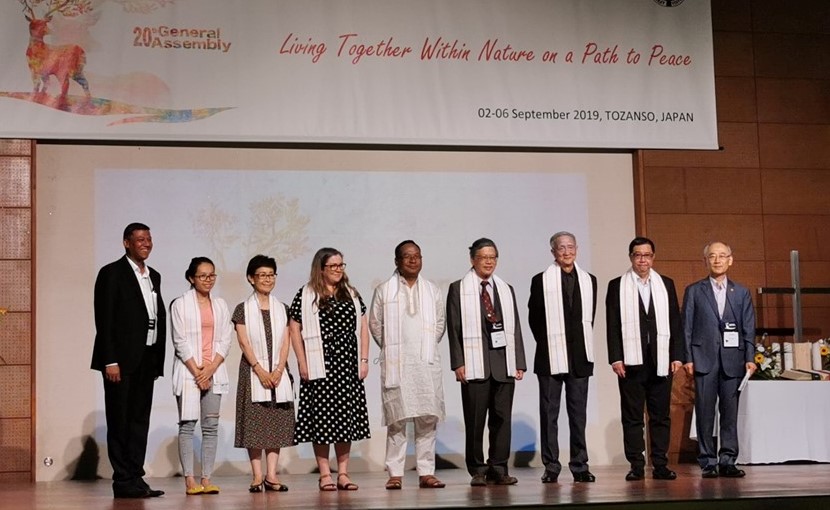 |
| ↑ New APAY Board Members with outgoing President and General Secretary |
In the afternoon, four forums were held with the participation of the delegates who opted for their participation at any of the following forums. (i) The Strategic Directions (for the next Quadrennial) (ii) Y’s Men and YMCA Partnernship (iii) Christian Foundation of the YMCAs and (iv) Student YMCAs.
In the evening of that day, the farewell dinner and the APAY cultural night were held. Each of the participating movements had the opportunity to present one cultural event at the evening.
APAY awards were handed over to the recipients during this cultural night. The eleven local/national YMCAs who had hosted various YMCA events since the last Executive Committee Meetings were recognized with commemorative plaques. The highest contributors of Golden Anniversary Trust Fund were recognized with commemorative plaques. They were two individuals - Mr. Babu Markus Gomes and Dr. Philip Kwok, and five YMCAs - Hong Kong Council of YMCAs, National Council of YMCAs of India, National Council of YMCAs of Sri Lanka, Macau YMCA and YMCA of the USA. Mr. Hiroyuki Tanaka, AP of Asia Pacific Area and Mr. Cha Young Doo, IPAP of Korea Area were given appreciation awards for their contribution to Advanced Studies Program whereas both IPIP Mr. Moon Sang-Bong and Dr. Kim Sang-Chae, AP of Korea Area, were given special recognition for their contribution to Laos YMCA establishment fund.
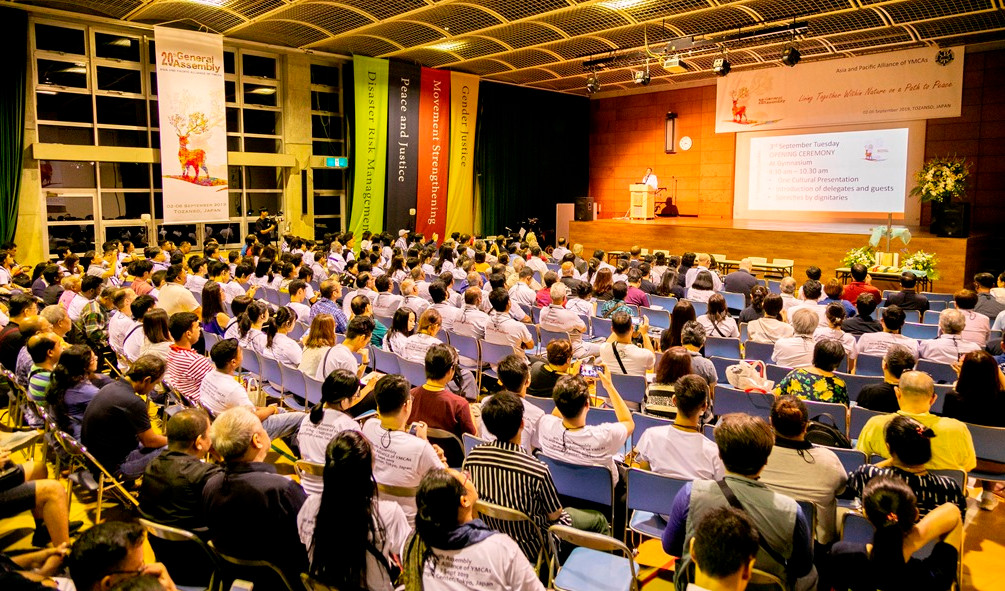
|
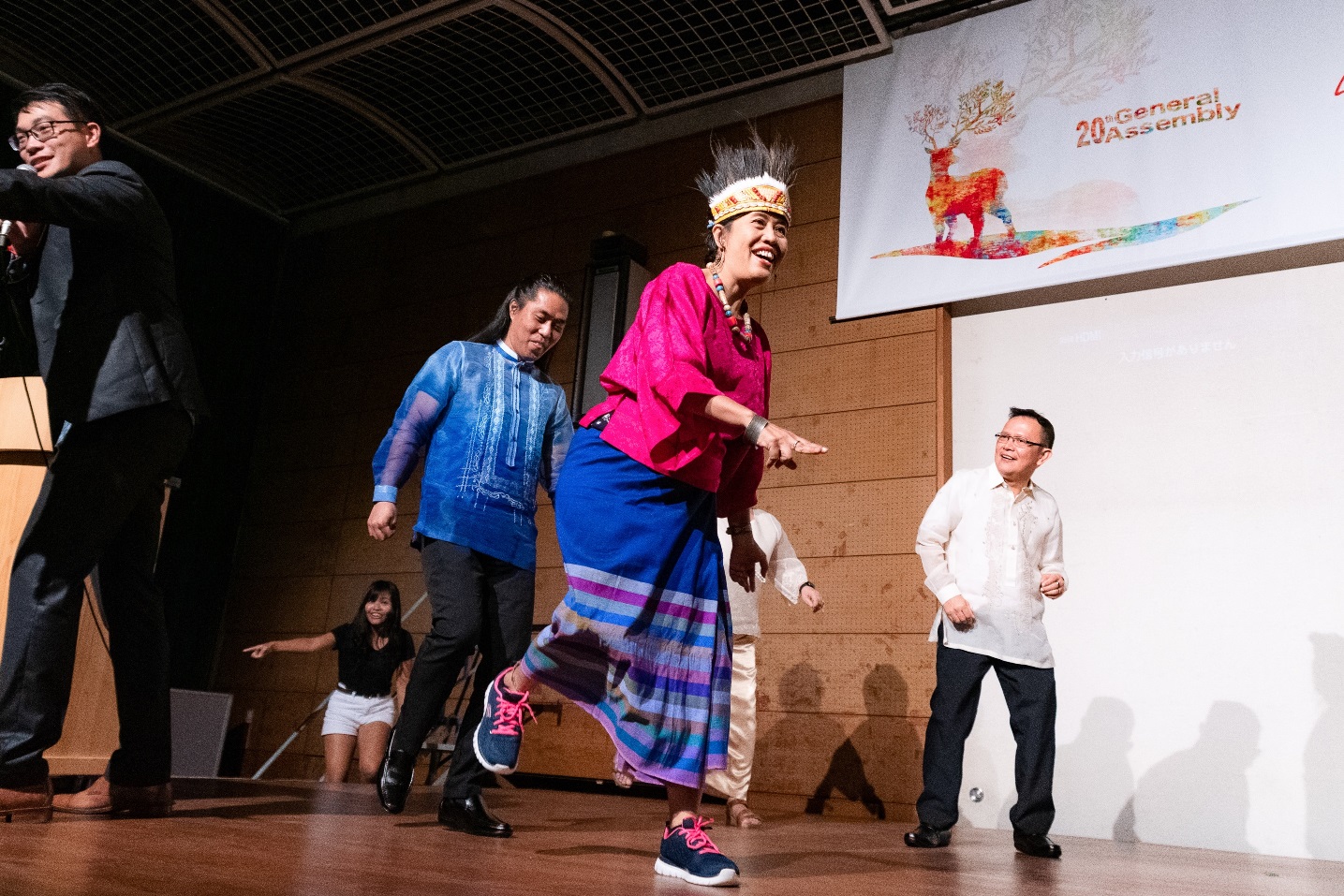 |
| ↑ GA delegates during orientation program |
↑ Retha Andoea, NGS YMCA Indonesia joined by delegates
during their presentation at APAY cultural night |
The recipients of the APAY Green YMCA Award for the year 2018 were Makati YMCA of the Philippines, Suncheon YMCA and Yongin YMCA of South Korea. The local hosts of the General Assembly, the YMCA Youth Center, Tozanso and the National Council of YMCAs of Japan were also appreciated with commemorative plaques.
On Friday 6th of September, Mr. Yohei Wakabatshi, Honorable Mayor of Gotemba City was the guest of honor at the closing ceremony. In the beginning, he delivered his words of greetings to the delegates. The acceptance speech of the newly elected President of APAY was delivered by Prof. Chen Chin-Seng, followed by the symbolic handover of the mandate by the outgoing President Mr. Babu Markus Gomes to the newly elected President. The Assembly mandate was presented by the writing team and then the 20th General Assembly concluded with an induction ceremony of the newly elected board members conducted by the present past presidents of APAY, namely Dr. Philip Kwok, Mr. Chim Hou Yan, Rev Sam Stephens, Mr. Yau Chung Wan and Ms. Patricia Pelton, President of the World YMCA. Dr. Ahn Jae-Woong, former General Secretary of the Christian Conference of Asia, delivered his sermon at the closing worship.
Earlier the Executive Committee Meeting and Council Meeting of APAY were held on Monday 2nd September prior to the General Assembly. The Annual Report of APAY was presented at the Executive Committee Meeting, while the Quadrennial Program Report was presented at the Council Meeting by Mr. Nam Boo Won, General Secretary of APAY. He presented the Quadrennial Program Evaluation Report at the Assembly as well. A Global Alternative Tourism Network (GATN) workshop was held during that time, and a special workshop of the Interfaith Cooperation Forum (ICF) was also organized on 4th and 5th September – for two full days – with some invitees from ICF alumni and selected YMCA youth as participants.
The APAY wishes to express its heartfelt gratitude to the 20th GA Planning Committee as well as Japan YMCA, in particular, the Host Committee of the GA for their dedication and contribution to the success of the GA!
The Assembly Mandate which reflects the outcome of the 20th General Assembly is as follows:
Mandate of the 20th General Assembly
Asia and Pacific Alliance of YMCAs
3 – 6 September 2019
Tozanso, Gotemba, Japan
“Living Together Within Nature on a Path to Peace”
The 20th General Assembly and the 4th Youth Assembly of the Asia and Pacific Alliance of YMCAs (APAY) were held from 1 – 6 September 2019 in Tokyo and Tozanso, Japan. The 377 delegates including 130 youth delegates from 22 countries, met to evaluate APAY’s programs for the past four years and to discuss the future directions of the movement in the next quadrennium and beyond.
Based on the theme, “Living Together Within Nature on a Path to Peace,” the Assembly focused primarily on the issue of environment protection and peace restoration. The keynote presentation emphasized on the need to work for a peace culture by holding on to the goal of universal health and well-being, and the non-violent resolution of conflicts to the satisfaction of all parties. The YMCAs were challenged to consider two immediate tasks: one, to abandon industrial agriculture, radically reduce reliance on petroleum, and build self-supporting and sustainable communities by working with and not against nature; and two, to engage in a campaign to abolish nuclear weapons. YMCAs were also urged to focus less on money, and more on a common mission, larger than the YMCA itself. To do this, we must look to Jesus, the Prince of Peace.
The delegates engaged themselves in various discourses/discussions and reconfirmed their conviction to continue their efforts in addressing the regional/global issues through the YMCA actions at local, national and regional level.
Christian Foundation of the YMCA
The Christian faith was core to the founding of the YMCA movement. 175 years later, within the multi-religious and multi-cultural regional contexts, how does YMCA retain/deepen the Christian foundation in a more relevant and dialogical way? The YMCAs were encouraged to re-introduce Bible Studies using contextualization of the scripture as well as understanding different expressions through the YMCA, with a view to seeking new common ground on which to identify the main tasks of the YMCAs. Our experiences, beliefs and actions must be aligned in order to result in the transformation of communities and the empowering of youth. YMCAs are challenged to evaluate whether we were market-driven or mission-directed.
With human failure, creation is destroyed; with human response to restore, creation is sanctified. The challenge for the YMCA is to craft a new worldview, where we are called to serve, with a sense of urgency, the process of restoration towards peace and sustainability.
Strategic Vision of APAY
We envisage a world in the future 25 years from now to be an efficient world dominated by automation technology and Artificial Intelligence. YMCA will need to play a role where humanizing encounters and experiences will still be valued.
We envisage a world where natural resources of the earth will be seriously depleted, ecology and ecosystem seriously challenged. The YMCA will need to be at the forefront of the battle against Climate Change and promoting low-carbon lifestyle and sustainable travel.
In a world that is increasingly fragmented along racial, religious lines, YMCAs are being called to provide education of youth in a holistic nature and inclusive way through e-platforms and other conventional means. The YMCAs in the Asia and Pacific region commit to work further on the critical issues in the region particularly on interfaith cooperation, environmental conservation, peace and reconciliation.
Youth Empowerment
Committed to Challenge 21, particularly on: “Empowering of all especially young people and women…”, it remains to be the strength of the movement. This strength sprang from the identity of the YMCA that is rooted on its Christian character as an ecumenical movement, and is geared towards human development particularly for youth, women, and children. This identity is challenged to be more reflective of Jesus Christ’s examples by living the heart of YMCA’s mission for justice, community development and social transformation.
Thus, a greater call for this to respond sustainably to the increasing needs and issues at a grassroot level such as: a) Women and children’s rights; b) Gender equality c) Environmental protection and conservation; d) Protection and inclusion of minorities; d) Poverty; e) Mental Health, and; g) Participation and Leadership development, remain to be at the forefront of the youth’s concern. Therefore, the young people call on APAY to continue education and awareness program on pertinent issues at the grassroots level, organize projects and programs that respond to the issues of the communities, network with other organizations for effective results/impacts, ensuring participatory development process and engagement.
Good Governance
The YMCA will endeavor to promote good governance ensuring accountability and transparency in its dealings with its management and movement, taking into consideration the changing trends and needs of its stakeholders, communities and society at large. We commit to ensuring that, as true stewards of God-given mission, it is concomitant on our part to make our YMCAs genuinely accountable and response-able in our governance as ‘collective leadership’.
Good governance practices at the YMCA will be based on Participation, Accountability and Transparency model, forming the three pillars of our entire operations, thus (i) providing participatory decision-making process for the stakeholders; (ii) transparent and accountable framework of operations aimed at consensus building; (iii) ensuring a strategic vision with a long term perspectives on human development and a deep understanding of the cultural, historical and social complexities; (iv) policies and practices based on ethical principles; and (v) Elimination of the conflict of interests.
Gender Justice
The commitment for Gender Justice remains to be an important matter in the YMCA specially that the Asia and Pacific is a diverse region, and response on the promotion of Gender Equity should be taken more on a community-specific approach. It is affirmed that the quest for the elimination of discrimination and promotion of an inclusive society requires a collaborative undertaking irrespective of sex and gender. The YMCAs will continue to establish an inclusive environment by creating policies that does not discriminate gender and develop a mechanism that addresses gender issues, such as sexual harassment. We need to increase dialogue and discussions on different perspectives about gender including the non-binary perspective of gender.
Disaster Response
The changes brought by climate change increase vulnerability of the peoples and communities in Asia and the Pacific region to disaster. In dealing with this, it is imperative to contextualize the concerns in order to have a community-specific approach, and to consider the movements’ capacity including its resources. The APAY commits to strengthening its response on disaster management, highlighting the importance of mitigation in reducing the risks. The APAY emphasizes conducting proper assessment including stakeholders’ power analysis, and increase multi-stakeholders’ partnership in response to the issues. To be emphasized as well is to increase capacity-building programs for national movements by partnering with like-minded organizations. It is highly recommended for national movements to assign a focal person on disaster response program.
Global Alternative Tourism Network and Social Entrepreneurship
Tourism has become major component of the global economy and currently mass scale tourism dominates the industry. Some of the major concerns of the mass scale tourism are over-tourism, high carbon and high water footprint, environment pollution and unfair distribution of profits. It is evident that mass scale tourism is unsustainable and unjust. Thus, we are called upon to promote Global Alternative Tourism Network (GATN) initiative and to promote sustainable and responsible means of tourism by continuing training for the YMCAs particularly young people, improve networking among YMCAs and encourage YMCAs to operate GATN as social enterprises for the benefit of the local communities.
Ecological Concerns and Climate Change
Climate Action is a priority for APAY and as movement focussed on youth empowerment, it is important for YMCAs to address Ecological Concerns and Climate Change Education in the communities. Special focus needs to be given to youth and children so that they are empowered to take initiatives towards Low Carbon Society. The YMCAs are also urged to create and implement Green Policies, Green Team as well as establish mechanism that promotes green lifestyles in the YMCAs and advocacy on combatting climate change. The YMCAs in the region commit to reducing the carbon emissions and taking effective steps to become carbon neutral by 2030. The YMCAs need to be environmentally sensitive when conducting events conducive towards the protection of the environment, using no plastic and being paperless.
Interfaith Cooperation Forum
Conflict will always be around. It is complex and it emerges from the interconnection of the cultural and structural violence that result in physical violence. As such, a peacebuilder must consider people’s attitudes, systems and structures that breed violence. The challenge, therefore, is on how peacebuilder accompanies those who are in the process of peacebuilding. Strategic peacebuilding is a long-term construction of peaceful and stable societies grounded on justice and restoration of relationships. Thus, APAY will continue its journey of inter-faith and inter-ideological dialogue and cooperation for building communities based on justice, peace and compassion.
Sustainable Development Goals (SDGs)
The YMCA, as a global movement, has accepted the SDGs as a blueprint to achieve a better and more sustainable future for its many stakeholders. The YMCAs, being a part of the civil society, do have great role to play in achieving the 17 Sustainable Development Goals. The YMCAs of our region are already involved in realizing these goals through their existing programs. However there is need to map these initiatives at regional and global level, and network with other like-minded CSOs in achieving these goals. APAY is committed to eradicating poverty and inequality based on sustainable development with utmost care for the environment.
YMCA -Y’s Men Partnership Building
The forum was the place for sharing success stories in partnership building between YMCA and YMI and to find out how best the partnership can be further strengthened. The key point is to start and keep dialogues between leaders of local and national levels from both YMCA and YMI. For that, we need to find liaison persons of local and national levels where non-existing. Those YMCAs that have a good working relationship with local Y service clubs have seen mutual benefits for the growth of the two organizations. Several YMCA leaders at the forum have expressed great interests in partnering with Y’s Men’s Clubs in the respective territories. Both organizations were encouraged to work together and strengthen each other for mutual benefit towards achieving the common mission.
Student YMCAs
The students joining YMCA activities strongly affirm that in-depth learning about youth life and social realities are acquired through various interactions. The interactions created through various YMCAs programs and activities present an array of opportunities to connect with people and societies. Such approach to youth empowerment leads the youth to have an increased knowledge and a deepened understanding on social issues and a sense of responsibility to contribute to the development of communities. Thus, these platforms of interactions must be conducted to engage young students within the YMCA to participate in the process of social transformation. Recognizing Student YMCAs as a strong source for leadership development, YMCAs in the region will continue to strengthen Student YMCAs.
Current issues in the regional context
The APAY 20th General Assembly recognizes the current political tension between Japan and South Korea which is closely connected to peace and stability in our region. The YMCA is a movement committed to peace and reconciliation among peoples of different nations. Therefore, we urge the respective governments to overcome the situation in a peaceful and dialogical way. Furthermore, we encourage the YMCAs of Japan and Korea to be mediators and peacemakers in this trying time. Likewise, as called upon by Challenge 21, the APAY will continue to “seek to be mediators and reconcilers in situations of conflict, and work for meaningful participation and advancement of people for their own self-determination” in the regional context and realities.
~ Duncan Chowhdury, Executive Secretary
4th APAY Youth Assembly
Youth empowerment for a more sustainable grassroots response
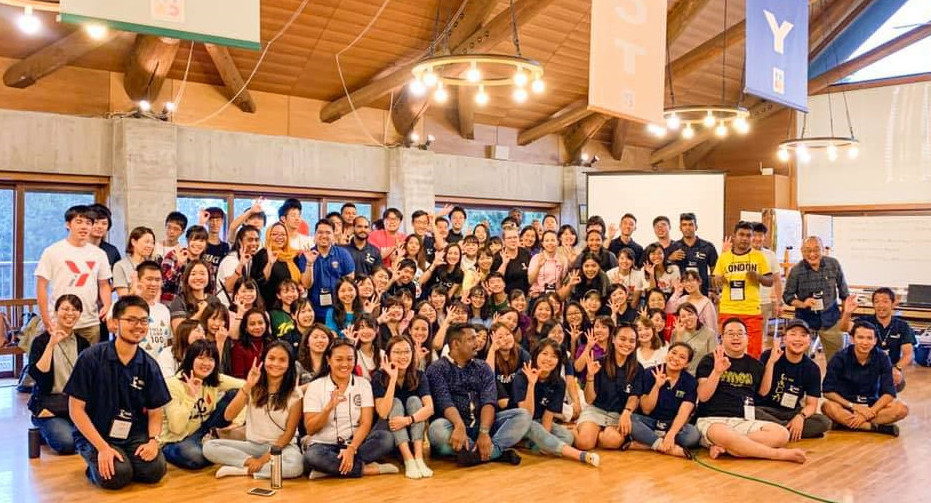
“Empowering all, especially young people and women to take increased responsibilities and assume leadership at all levels and working towards an equitable society.”
- Challenge 21 Imperative
One hundred sixteen youth from 16 national movements who participated in the 4th Asia and Pacific Alliance of YMCAs Youth Assembly (YA) held in Japan last September 1-2, 2019 strongly affirms that the commitment to Challenge 21 imperative of “empowering all, especially youth and women, remains to be the strength of the movement”. This strength sprang from the deeply rooted YMCA Christian character that respects diversity, embraces inclusivity and works toward human development. This identity is challenged to be more reflective of Jesus Christ’s examples by living the heart of YMCA’s mission for justice and peace, community development and social transformation.
Through the YA learning session, the participants shared stories that included their individual and the organizational journeys with the YMCAs from local, national, regional and global contexts. This opportunity provided helpful information that assisted young people in finding a sense of organizational identity with the end in view of creating impact on how to help shape the future. The learning session on knowing the movement was complimented by a dialogue on understanding social problems that include identification and analyses of causes and considerations of possible solutions. Through this sharing, it was hoped that the participants would be able to locate themselves and the movement in the social context and in the process of addressing social problems.
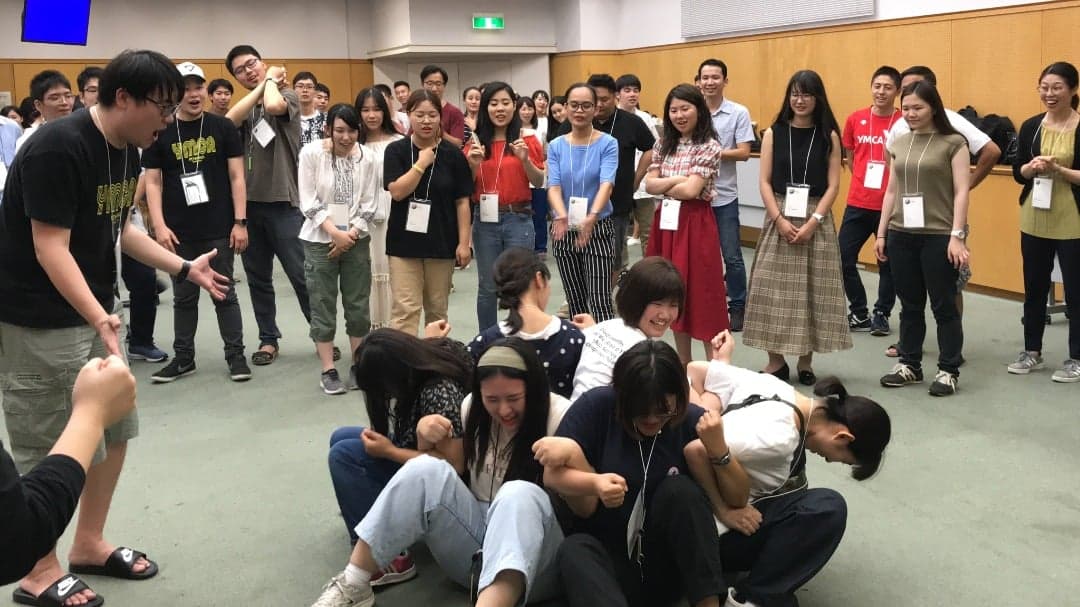 |
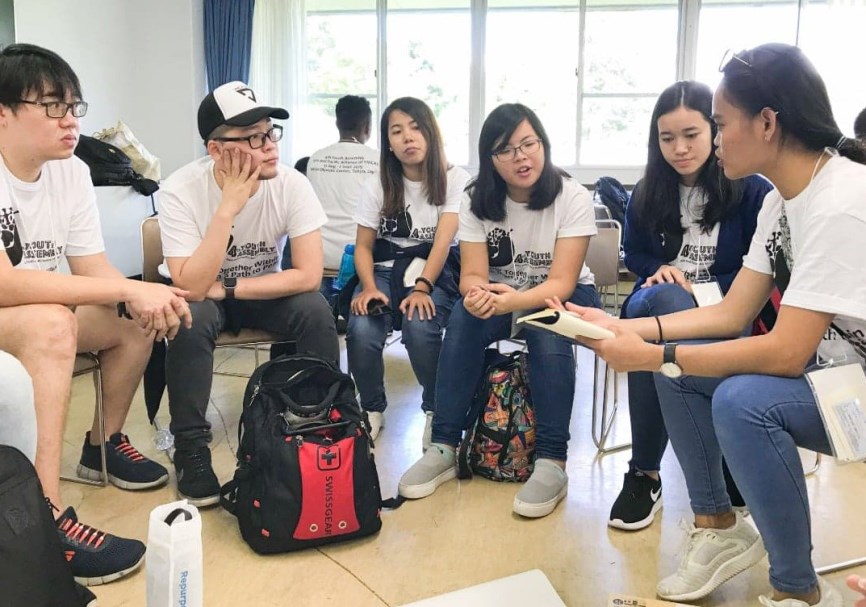
|
↑ Youth Assembly participants encourage each other during
team building activities |
↑ Sub-regional discussion on youth and YMCA responses |
It is worthy to know what the youth thinks of the societal issues affecting them and communities. Hitomi, a Student YMCA from Japan, said that gender justice is one of the prevalent issues that bothers her. She stressed that women remain to be stereotyped on certain roles and behaviors and still cannot voice out their opinion. She strongly states that, “We must put a stop on this issue because women cannot tolerate it anymore.”
On another concern, Paul from Chinese YMCA of Hong Kong shared that most youth from his place are suffering from depression because of the competitive educational system and the thoughts of job prospects in the future. As a result of the exchanges, the youth strongly calls for each YMCA and the regional alliance to respond sustainably to the increasing needs and issues at a grassroots level such as women and children’s rights; gender equality; environmental protection and conservation; protection and inclusion of minorities; poverty; mental health; and youth participation and leadership development.
The youth emphasized that as part of the solution on addressing the above mentioned issues, the YMCAs must strengthen its commitment of providing access to youth participation and leadership development. Therefore, the young people call on APAY to continue education and awareness-building programs on pertinent issues at the grassroots level, organize projects and programs that respond to the issues of the communities, network with other organizations for effective results and impacts, and ensuring participatory development process and engagement. As Melody, a young staff of YMCA Makati said during the YA, “With the help of YMCA, I want to be part of the solution.” It is indeed important that we all work together as part of a wider social movement working towards social transformation.
~ Maria Cristian L. Miranda, Executive Secretary
Change Agent Regional Training conducted prior to its global gathering and YMCA175
The regional training of YMCA Change Agents Cohort 4 was held at YMCA Fairthorne Manor, United Kingdom last July 28-31, 2019. This regional youth group, part of World YMCA Change Agents, coming from 10 national movements namely Australia, Hong Kong, Japan, Malaysia, New Zealand, Philippines, Singapore, Sri Lanka, South Korea and Taiwan comprises 24 volunteers, staff and university students.
The regional training that was organized by APAY is a mandatory component of the WAY Change Agent Program. This was in view of creating a curriculum that ensures better alignment to national, local and regional YMCAs that will eventually meet the needs of the youth and the movement. As such, the regional training focused on area level priorities, realities and issues.
On the regional level, the Change Agents were given an opportunity to integrate within the existing regional youth participation and leadership development programs that aim to build potentials of youth in becoming socially responsible citizens and leaders through spiritual enrichment, education, value formation and capacity building.
The regional training specifically aimed to promote critical thinking and understanding on social realities/issues affecting youth and communities; to create awareness and develop appreciation on Asia and Pacific YMCAs identity and goals; to organize this group to take active role in leadership, youth-led actions and advocacies that advances both the strengthening of the movement and the call for sustainable community development. It also aimed at representing the concerns of the youth rooted in their national and regional realities to the global context.
The Regional Training included the following areas of learning: 1) Historical Journey of respective YMCAs; 2) National Social Realities and its Bearing on the Work of YMCAs; 3) Mission in Context: YMCA Historical and Theological Perspective; 4) History and Philosophy of YMCA in Asia and Pacific Context; and how to plan programs/projects in a relevant way.
The regional training played a vital platform in strengthening the connections among the youth from Asia and Pacific region as they continued the learning experience during the global gathering which was held last August 1-3, 2019. The said global gathering was participated by 120 youth agents from 42 countries around the globe. Similarly, the teamwork continued to build up until the YMCA175 which was joined by around 3000 delegates comprising the world YMCA family.
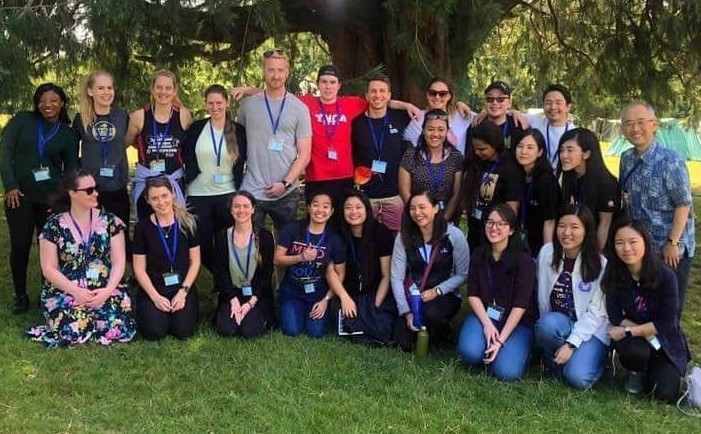 |
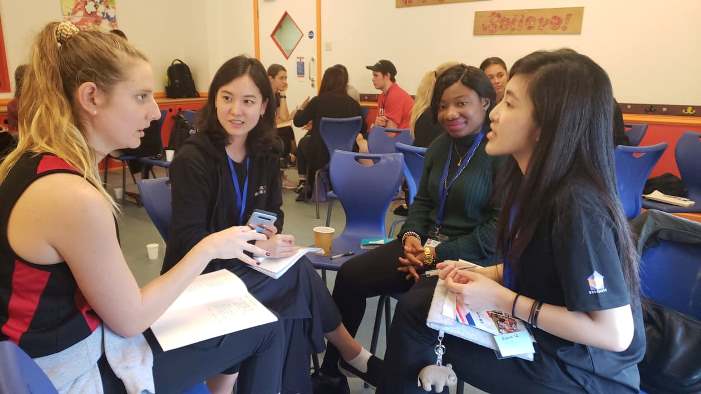
|
↑ Twenty-four youth represents APAY during the change agent
Regional Training and Global Gathering |
↑ Change Agents from APAY during small group discussionon
social problems |
~ Maria Cristina L. Miranda, Executive Secretary
4th Regional Conference on Climate Change in Ulaanbaatar
The APAY 4th Regional Conference on Climate Change was held on 26-29 September, 2019 at Ulaanbaatar, Mongolia. Sixteen youth leaders from Korea, India, Indonesia, Taiwan, Myanmar and Mongolia participated in the program jointly hosted by the Asia and Pacific Alliance of YMCAs and YMCA of Mongolia. It was the first regional program hosted by the YMCA of Mongolia.
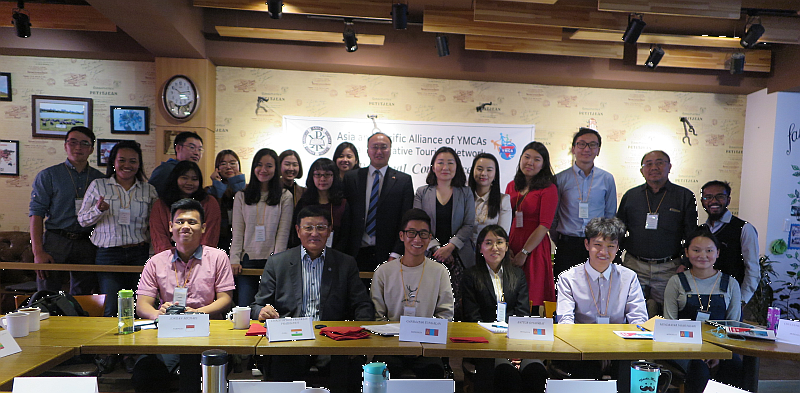 |
| ↑ Our classroom is the Mongolia YMCA Cafe |
The APAY runs E-Learning course on Climate Change, an online platform designed with 9 different modules covering different areas related to Climate Change. Participants who successfully complete the e-learning are required to design and implement an action plan based what they have learned. The Regional Conference on Climate Change was the final and concluding activity of APAY E-learning on Climate Change course which stretched over a 6 month period. At this conference, participants were provided additional information and resources on issues related to combating climate change that is not covered by the e-learning. Participants also had opportunity to exchange information and experiences related to combating climate change by their local communities and YMCAs.
The conference opened with music from “Horsehead Fiddle”, a traditional Mongolian 2-string violin. This was followed with welcome greetings by Munkhtsog Davaadorj, General Secretary of Mongolia YMCA and a short reflection by Javkhlantugs Ganbaatar, President of Mongolia YMCA.
In the first session, Dr. Professor Adiyasuren from Eco-Asia College gave a presentation on “Sustainable Development Goals, Tourism and Climate Change”. Mr. Adiyasuren was also the former head of the Ministry of Environment and Tourism in Mongolia. He shared that Mongolia, which is a non-industrial desert country, contributes only a part of the global GHG emission and carbon footprint, yet it is impacted with very hot summers and very cold winters that often killed livestock and other animals. The extreme weather changes also caused migration of the nomad herders into the city of Ulaanbaatar. He emphasized that Climate Change effects Mongolia and that we have to take action on this global problem together.
In the second session, Cristina Miranda-Lastima from APAY spoke on “Gender and Climate Change”. She took on a thought-provoking session bringing out the hard truth of the reality of sexism in the society. It was very engaging and interactive session.
The session on “Food and Water Security” was led by staff members from the Green Asia Network. The Green Asia Network NGO is committed in combating desertification and yellow dust storm by planting trees. This yellow dust storm starts from Mongolian Gobi desert area and travels to China, Korea and even to Japan. They emphasized that the yellow dust storm is a result of Climate Change so we have to take action together.
Water scarcity and access to clean drinking water is also closely related to climate change. In the session on “Water Footprint”, CHAN Beng Seng, coordinator for GATN explained the importance of being aware of our own water usage, both directly and indirectly. It is important that we to adopt a lifestyle that has both low-carbon as well as low-water footprint.
The next day was our exposure day. In the morning, we visited to Mongolia Clean Water Center and learned about how they distribute clean water in the city. The MWCC introduced smart technology to control and distribute water usage in the Ulaanbaatar city. We also witnessed how people from communities in the poorer districts had to buy water in plastic containers from water filling stations and transport them back to their homes. In the afternoon, we went to Tuv Aimag province in the countryside and visited nomadic herder family. It was very valuable time and experience for most students to learn about how they live and also how precious water is to nomadic people. We also learned how to build Mongolian Ger dwelling in the steppes of Mongolia (round tent covered with skins/felt).
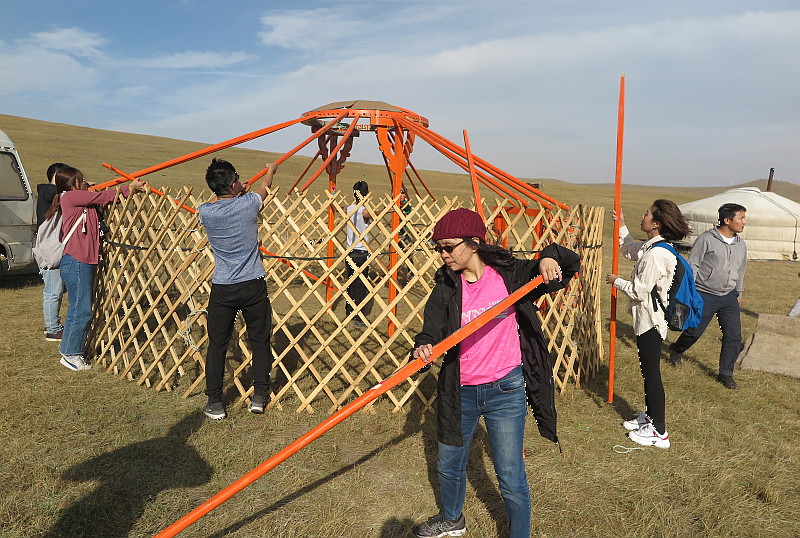 |
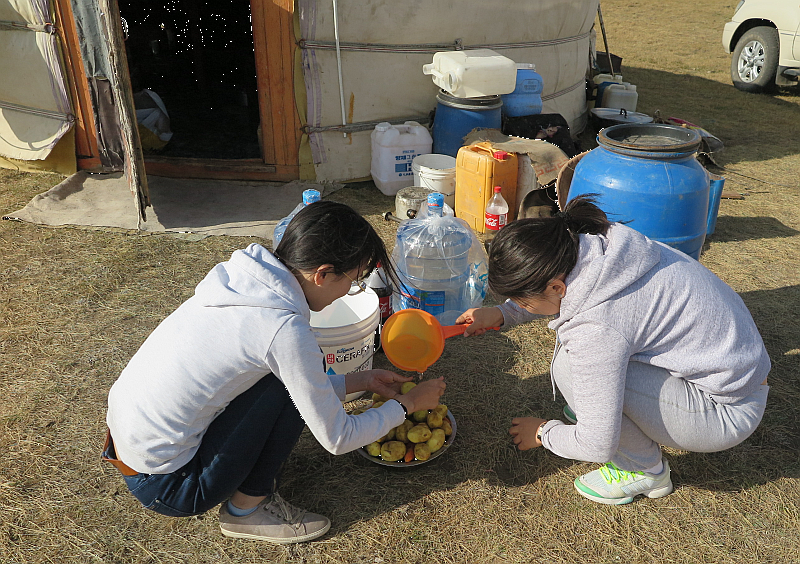 |
| ↑ Working together to setup a Ger in 2 hours |
↑ Learning to cook with very little water |
And as the final part of the conference, all participants presented their Action Plans for combating climate change to show practical application of the knowledge gained from the e-learning. They introduced very unique ideas and programs to combat Climate Change in the local YMCA communities. Overall, it was fruitful time to conclude after completing e-learning course on Climate Change 2019 all summer.
~ Andrew Bat-Unur, GATN Intern / Chan Beng Seng, GATN Coordinator
The Silver Jubilee Celebration of the YMCA of Macau
The Silver Jubilee Celebration of the YMCA of Macau was held on 27-28 September 2019 in Macao Polytechnic Institute. The Celebration Ceremony brought together over 300 community members, volunteers, staffs, board members, representatives from the Macau SAR Government and social partnerships, the new President and General Secretary of APAY, Vice President of National Council of YMCAs of China, and YMCA leaders attending from Shanghai, Hangzhou, Chengdu, Guangzhou, Taipei, Tainan, Taichung, Nantou, Hong Kong and Singapore.
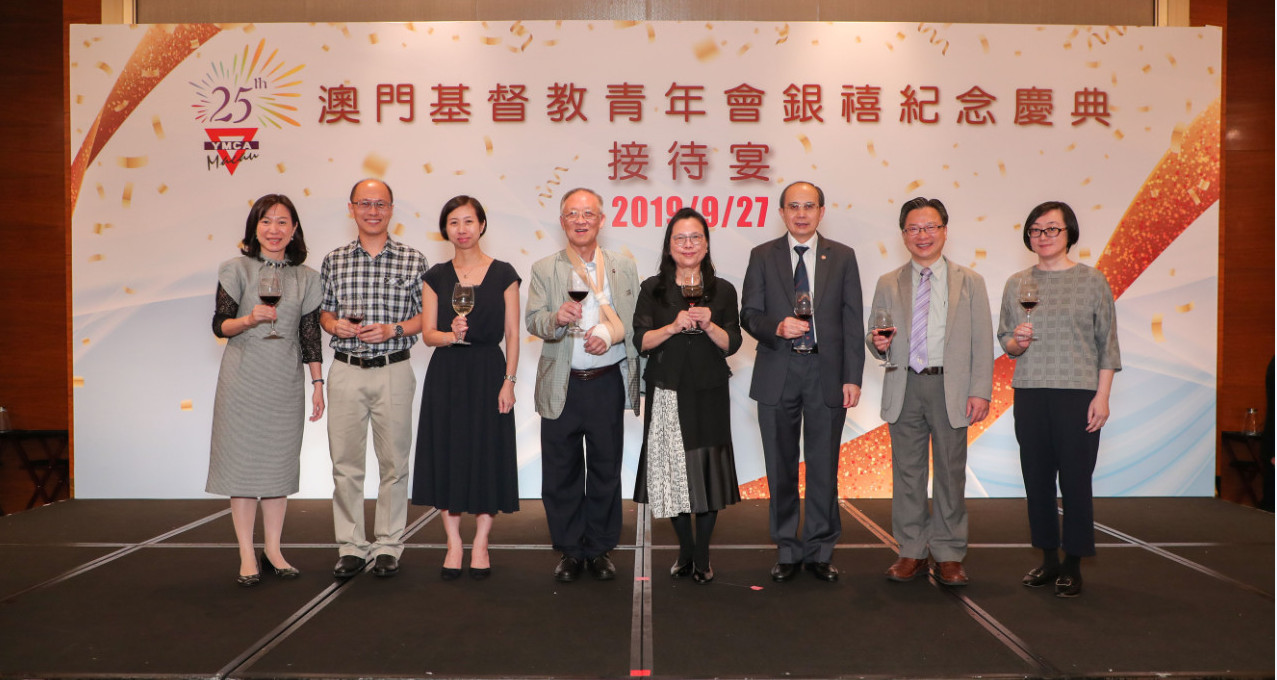 |
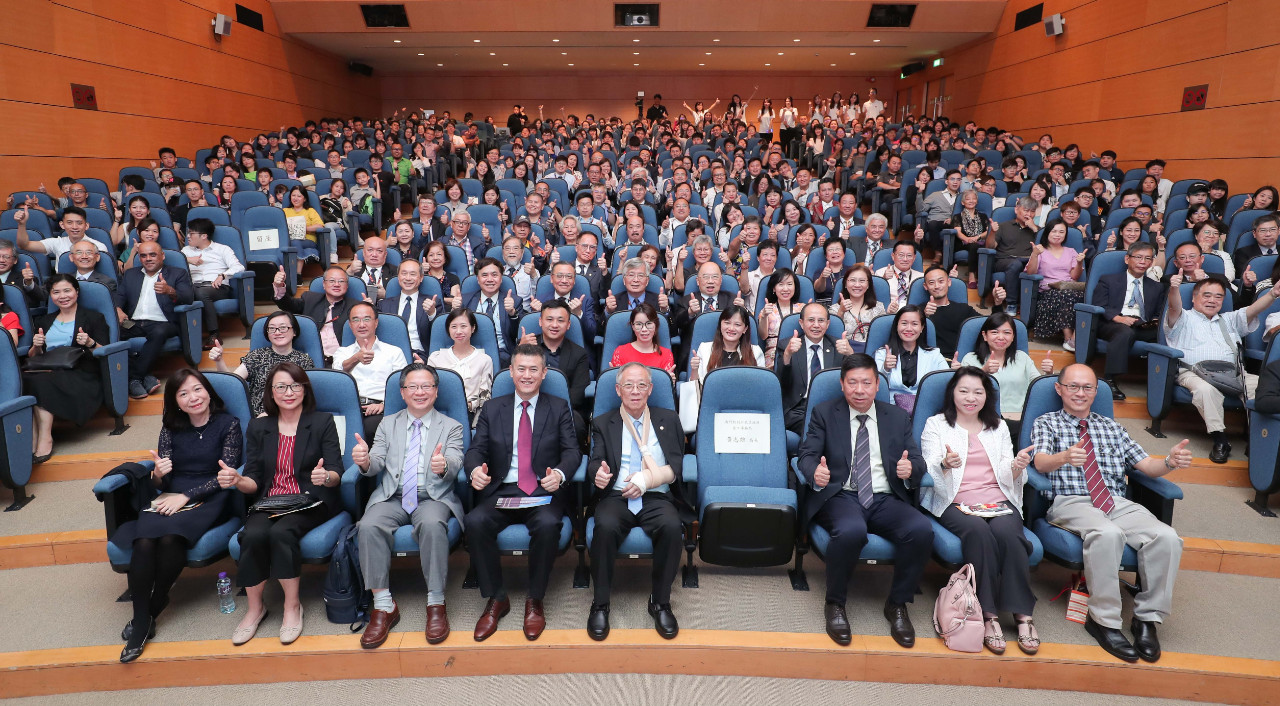 |
The Celebration coincided with the launching of the 13th Guangdong, Hong Kong, Macau, Taiwan and Singapore Youth Counseling Conference that was held on 27 September. Themed “The integration of using multi-media in the work of Youth Counseling”, the keynote speakers from different regions shared their authentic work with young people. The YMCA of Macau hosted a welcome dinner for honored guests and YMCA leaders, where a series of performances, felicitation and handsels were delivered.
The Celebration Ceremony kicked off with a joyful dance performed by volunteers, which was followed by a short movie “The Best Leap” and a song performance to highlight the core value of companionship which was in accordance with the motto of YMCA Movements: “Not to be served, but to serve”. A video clip of activity review concluded the splendid memories of the YMCA movements in Macau towards serving its people and communities for the past 25 years. YMCA of Macau will continue to serve its community and look forward to the journey to reaching another milestone. YMCA of Macau is grateful for taking this opportunity to share with other movements about this landmark occasion.
For the photos and video clip about the Silver Jubilee Celebration of the YMCA of Macau, please visit https://www.ymca.org.mo/ and scan the QR code provided before 25 October.

~ YMCA of Macau
|
